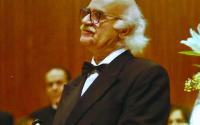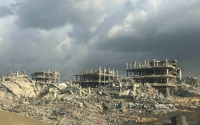January 28, 2003By WILLIAM J. BROAD
Forty-one American Nobel laureates in science and economics issued a declaration yesterday opposing a preventive war against Iraq without wide international support. The statement, four sentences long, argues that an American attack would ultimately hurt the security and standing of the United States, even if it succeeds.
The signers, all men, include a number who at one time or another have advised the federal government or played important roles in national security. Among them are Hans A. Bethe, an architect of the atom bomb; Walter Kohn, a former adviser to the Defense Advanced Research Projects Agency at the Pentagon; Norman F. Ramsey, a Manhattan Project scientist who readied the Hiroshima bomb and later advised NATO; and Charles H. Townes, former research director of the Institute for Defense Analyses at the Pentagon and chairman of a federal panel that studied how to base the MX missile and its nuclear warheads.
In addition to winning Nobel prizes, 18 of the signers have received the National Medal of Science, the nation's highest science honor.
The declaration reads:
"The undersigned oppose a preventive war against Iraq without broad international support. Military operations against Iraq may indeed lead to a relatively swift victory in the short term. But war is characterized by surprise, human loss and unintended consequences. Even with a victory, we believe that the medical, economic, environmental, moral, spiritual, political and legal consequences of an American preventive attack on Iraq would undermine, not protect, U.S. security and standing in the world."
Dr. Kohn, a Nobel chemist at the University of California at Santa Barbara, organized the declaration.
"No voice was speaking against the war," he said. "So I asked, `Can I somehow make myself useful?' and had the idea of contacting my Nobel laureate friends and trying to rally them around a reasonable position."
Dr. Kohn said he eventually tried to contact all American Nobel laureates in science and economics, who are thought to number about 130. But some had died or were unreachable, he said, while others never replied. Dr. Kohn said only six respondents declined to sign the declaration.
He said the signers included Democrats and Republicans alike.
Patricia Halloran, an aide to Dr. Kohn, said that more signatures were expected in the next few days as laureates returned from foreign travels or caught up with their mail.
Occasionally, science Nobelists have banded together to speak out, usually on topics of war and peace, arms and technology. In July 2000, 50 Nobel laureates urged President Bill Clinton to reject a proposed $60 billion missile defense system, arguing that it would be wasteful and dangerous. In October 1999, 32 Nobel laureates in physics urged the Senate to approve the Comprehensive Test Ban Treaty, calling it central to halting the spread of nuclear arms.
The Iraq declaration is to be circulated on Capitol Hill by Senator Dianne Feinstein and Representative Lois Capps, both California Democrats.
The signers are these, with E designating economics; P, physics; C, chemistry; and M, medicine or physiology:
George A. Akerlof EPhilip W. Anderson PPaul Berg CHans A. Bethe PNicolaas Bloembergen PPaul D. Boyer COwen Chamberlain PLeon N. Cooper PJames W. Cronin PRobert F. Curl Jr. CVal L. Fitch PRobert F. Furchgott MSheldon L. Glashow PRoger Guillemin MHerbert A. Hauptman CAlan J. Heeger CLouis J. Ignarro MEric R. Kandel MHar Gobind Khorana MLawrence R. Klein EWalter Kohn CLeon M. Lederman PYuan T. Lee CWilliam N. Lipscomb CDaniel L. McFadden EFranco Modigliani EFerid Murad MGeorge E. Palade MArno A. Penzias PMartin L. Perl PWilliam D. Phillips PNorman F. Ramsey PRobert Schrieffer PWilliam F. Sharpe EJack Steinberger PJoseph H. Taylor Jr. PCharles H. Townes PDaniel C. Tsui PHarold E. Varmus MRobert W. Wilson PAhmed H. Zewail C






